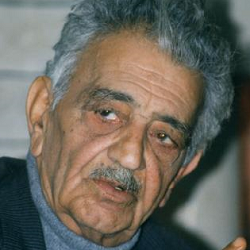HABIBI, EMILE (1921-1996)
Born in Haifa in Aug. 1921 into a Palestinian Protestant family; studied in Haifa and Acre; worked in Haifa’s oil refinery as a construction worker, then as radio announcer in the Palestinian Broadcasting Service in Jerusalem (1941-43); joined the Palestinian Communist Party in 1940 and became one of its leaders, operating underground during the British Mandate in the 1940s; one of the founders of the National Liberation League (Usbat Al-Taharrur Al-Watani) in 1943, along with Haidar Abdel Shafi, Mukhlis Amer, Emil Tuma and Mufid Nashashibi; editor of Al-Mihmaz newspaper; joined the Israeli Communist Party after the 1940s and became chief editor of its paper Al-Ittihad; represented the party in the Knesset for 19 years from 1953-72 (since 1965 for Rakah which emerged from the Israeli Communist Party); edited Al-Ittihad that served as the Arabic mouthpiece for the party in the 1970s; began writing short stories in the 1960s; resigned from the Knesset in 1972 to write his novel, The Secret Life of Saeed, the Pessoptimist (Arabic, 1974; English, 1982), depicting the life and fortunes of an Arab citizen of the state of Israel; proponent of Arab-Israeli coexistence; noted Palestinian-Israeli author, playwright, and journalist, who received several literary prizes, incl. the top PLO literary honor, Jerusalem Prize (1990), and the Israel Prize (1992); left Rakah in 1991 over a position the party adopted vis-à-vis Soviet leader Gorbachev; established the Arabesque House Publishing Company in Haifa the same year; in 1995, produced the monthly literary journal Masharif; authored several renown books, incl. Kufr Qassem - The Massacre and the Politics (Haifa, 1976), Ikhtiyyeh (1985), The Tale of Saraya, the Daughter of the Ogre (Arabic, 1991), as well as plays, such as Lakka’ ben Lakka’ (1980) and Um-Al Robabika (1992); also published a collection of his essays and articles known as Towards a World Without Cages (Arabic, 1993); died in Haifa on 2 May 1996 (his tombstone reads - as he had requested: “Emile Habibi - Remained in Haifa”).

ولد في مدينة حيفا عام 1921؛ درس في حيفا وعكا؛ اشتغل كعامل بناء في مصفاة حيفا للوقود، ثم مذيعاً في دار الإذاعة الفلسطينية في القدس خلال 1941 - 1943؛ انضم إلى الحزب الشيوعي الفلسطيني سنة 1940 وأصبح أحد قياداتها؛ عمل في معسكرات الجيش البريطاني في الطيرة في الأربعينيات؛ أحد مؤسسي عصبة التحرر الوطني سنة 1943 مع حيدر عبد الشافي، مخلص عامر، إميل توما، ومفيد حبش وخليل البديري؛ محرر جريدة المهماز؛ انضم إلى الحزب الشيوعي الإسرائيلي بعد الأربعينيات وتولى رئاسة تحرير جريدة الحزب الاتحاد؛ مثّل الحزب الشيوعي الإسرائيلي في الكنيست مدة تسعة عشر عاماً من 1953 ولغاية 1972منذ 1965 مثل ركاخ الذي انشق عن الحزب الشيوعي الإسرائيلي؛ حرر صحيفة الاتحاد الناطق العربي باسم الحزب الشيوعي في السبعينيات؛ بدأ كتابة القصص القصيرة في الستينيات؛ استقال من الكنيست عام 1972 ليتفرغ لكتابة روايته الأدبية بعنوان الوقائع الغريبة في اختفاء سعيد, المتشائل عربي، 1974 ؛ إنجليزي، التي تصور حياة وقدر مواطن عربي في دولة إسرائيل؛ كان مؤيداً للتعايش العربي الإسرائيلي؛ عمل كمؤلف وكاتب مسرحي وصحافي وحاز على العديد من الجوائز الأدبية، بما فيها وسام منظمة التحرير الفلسطينية للأدب، وسام القدس للثقافة والفنون سنة 1990، وجائزة إسرائيل للأدب العربي عام 1992؛ غادر ركاخ عام 1991 على موقف تبناه الحزب الشيوعي إزاء قائد السوفيت غورباشوف؛ أسس دار عربسك للنشر في حيفا في نفس العام؛ في عام 1995، أصدر المجلة الشهرية الأدبية مشارف؛ ألف العديد من الكتب الشهيرة، بما فيها كفر قاسم - المجزرة والسياسة حيفا،1976، إخطية 1985، خرافية سرايا بنت الغول عربي، 1191، وألف العديد من المسرحيات، مثل لاكا بن لاكا 1980 وأم الروبابيكيا 1992 ونشر مجموعة من مقالاته المعروفة ب نحو عالم بدون قفص عربي 1993؛ توفي في حيفا في الثاني من أيار سنة 1996وبناءاً على طلبه كتب على قبره:- “إميل حبيبي - باق في حيفا”.
